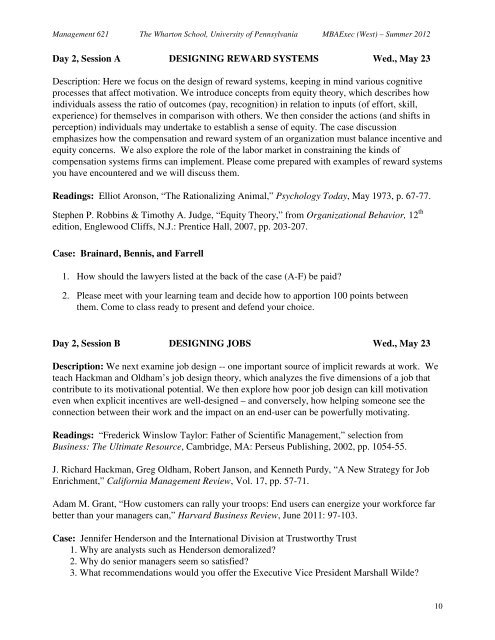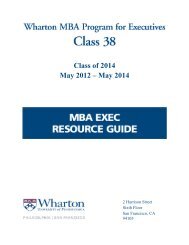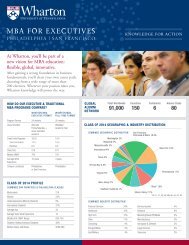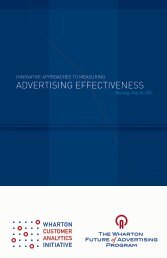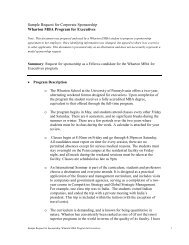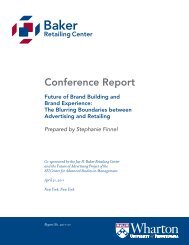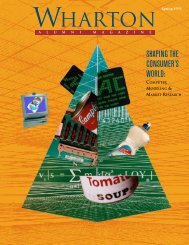version Date: April - The Wharton School of the University of ...
version Date: April - The Wharton School of the University of ...
version Date: April - The Wharton School of the University of ...
Create successful ePaper yourself
Turn your PDF publications into a flip-book with our unique Google optimized e-Paper software.
Management 621 <strong>The</strong> <strong>Wharton</strong> <strong>School</strong>, <strong>University</strong> <strong>of</strong> Pennsylvania MBAExec (West) – Summer 2012<br />
Day 2, Session A DESIGNING REWARD SYSTEMS Wed., May 23<br />
Description: Here we focus on <strong>the</strong> design <strong>of</strong> reward systems, keeping in mind various cognitive<br />
processes that affect motivation. We introduce concepts from equity <strong>the</strong>ory, which describes how<br />
individuals assess <strong>the</strong> ratio <strong>of</strong> outcomes (pay, recognition) in relation to inputs (<strong>of</strong> effort, skill,<br />
experience) for <strong>the</strong>mselves in comparison with o<strong>the</strong>rs. We <strong>the</strong>n consider <strong>the</strong> actions (and shifts in<br />
perception) individuals may undertake to establish a sense <strong>of</strong> equity. <strong>The</strong> case discussion<br />
emphasizes how <strong>the</strong> compensation and reward system <strong>of</strong> an organization must balance incentive and<br />
equity concerns. We also explore <strong>the</strong> role <strong>of</strong> <strong>the</strong> labor market in constraining <strong>the</strong> kinds <strong>of</strong><br />
compensation systems firms can implement. Please come prepared with examples <strong>of</strong> reward systems<br />
you have encountered and we will discuss <strong>the</strong>m.<br />
Readings: Elliot Aronson, “<strong>The</strong> Rationalizing Animal,” Psychology Today, May 1973, p. 67-77.<br />
Stephen P. Robbins & Timothy A. Judge, “Equity <strong>The</strong>ory,” from Organizational Behavior, 12 th<br />
edition, Englewood Cliffs, N.J.: Prentice Hall, 2007, pp. 203-207.<br />
Case: Brainard, Bennis, and Farrell<br />
1. How should <strong>the</strong> lawyers listed at <strong>the</strong> back <strong>of</strong> <strong>the</strong> case (A-F) be paid<br />
2. Please meet with your learning team and decide how to apportion 100 points between<br />
<strong>the</strong>m. Come to class ready to present and defend your choice.<br />
Day 2, Session B DESIGNING JOBS Wed., May 23<br />
Description: We next examine job design -- one important source <strong>of</strong> implicit rewards at work. We<br />
teach Hackman and Oldham’s job design <strong>the</strong>ory, which analyzes <strong>the</strong> five dimensions <strong>of</strong> a job that<br />
contribute to its motivational potential. We <strong>the</strong>n explore how poor job design can kill motivation<br />
even when explicit incentives are well-designed – and conversely, how helping someone see <strong>the</strong><br />
connection between <strong>the</strong>ir work and <strong>the</strong> impact on an end-user can be powerfully motivating.<br />
Readings: “Frederick Winslow Taylor: Fa<strong>the</strong>r <strong>of</strong> Scientific Management,” selection from<br />
Business: <strong>The</strong> Ultimate Resource, Cambridge, MA: Perseus Publishing, 2002, pp. 1054-55.<br />
J. Richard Hackman, Greg Oldham, Robert Janson, and Kenneth Purdy, “A New Strategy for Job<br />
Enrichment,” California Management Review, Vol. 17, pp. 57-71.<br />
Adam M. Grant, “How customers can rally your troops: End users can energize your workforce far<br />
better than your managers can,” Harvard Business Review, June 2011: 97-103.<br />
Case: Jennifer Henderson and <strong>the</strong> International Division at Trustworthy Trust<br />
1. Why are analysts such as Henderson demoralized<br />
2. Why do senior managers seem so satisfied<br />
3. What recommendations would you <strong>of</strong>fer <strong>the</strong> Executive Vice President Marshall Wilde<br />
10


